We are going to be covering the AMD Ryzen 7 launch with a number of pieces over the next week or so. The first question we will undoubtedly get asked is: how fast are the chips. Specifically this piece we are going to provide Ryzen Linux benchmark figures that you can compare with a huge array of systems, or even your own system. Some of the numbers were truly astounding. Today other sites are going to have a myriad of consumer parts tested against Ryzen, but we decided to take a slightly different approach. New, high clock speed AMD Ryzen versus Intel Xeon.
Edit: You can see these numbers compared to the Ryzen 7 1700 and Ryzen 1700X (with Linux Kernel 4.10.1) in our AMD Ryzen 7 1700 Linux Benchmarks – The Zen you should buy piece.
Test Configuration
Here is the test configuration we were using for these results:
- CPU: AMD Ryzen 7 1700X
- Motherboard: ASUS Crosshair VI Hero
- RAM: 16GB (4x 4GB) DDR4-2666
- Boot Media: SanDisk 32GB USB 3.0 Fit
- Operating System: Ubuntu 14.04 LTS
Unfortunately, AMD did not highlight Linux benchmarks for the Ryzen launch and was not keen to have the new chips tested with Linux. Luckily, we now have a Linux-Bench version that boots off of a USB key so we were able to pull a few numbers for you on launch day. From what we understand, there are patches for AMD Ryzen in Linux kernel 4.10 / 4.11 so this disposition may be related.
AMD Ryzen 7 1700X Linux Benchmarks
For our testing we are using Linux-Bench scripts which help us see cross platform “least common denominator” results. We are using gcc due to its ubiquity as a default compiler. One can see details of each benchmark here. We are likely going to update the Linux-Bench in the near future with a few new tests as well as an even simpler to use/ faster revision, but for now, we are using the legacy version that now has over 100,000 test runs under its belt.
The item to remember here is that any benchmark we are publishing has had at least 10,000 profiling runs on a multitude of different architectures to ensure we get consistent results before we add it to our repertoire. Normally we go one step further and heat soak every machine at 100% load for 24 hours. On multi-node systems we even use a “sandwich” and controlled temperature and humidity to ensure systems are as close to real-world temperatures as possible. Due to the short timeframe with the Ryzen chips before launch, we were not able to do our full runs. Furthermore, we tried water-cooled pre-production systems at the AMD Tech Day in San Francisco but those systems were not able to complete benchmark runs as the stability of the pre-production parts on display was an issue. We will have a follow-up piece after these chips have had sufficient time in the data center.
Python Linux 4.4.2 Kernel Compile Benchmark
This is one of the most requested benchmarks for STH over the past few years. The task was simple, we have a standard configuration file, the Linux 4.4.2 kernel from kernel.org, and make with every thread in the system. We are expressing results in terms of complies per hour to make the results easier to read.
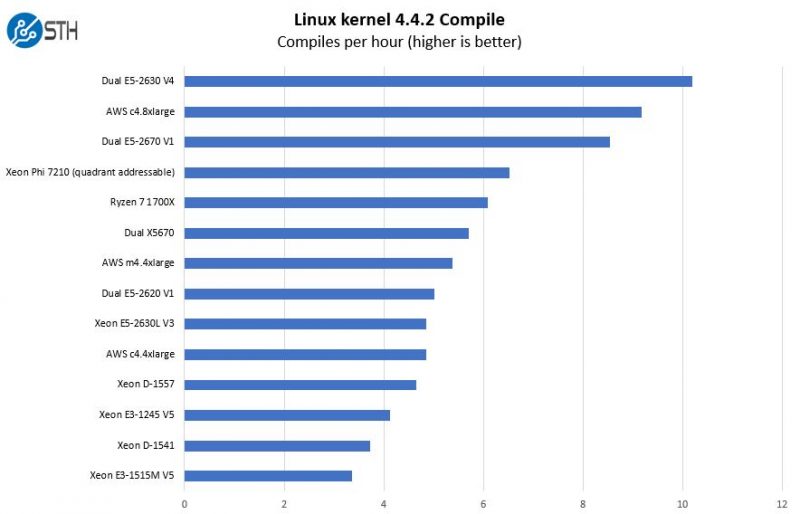
This one we had a little bit of fun with. We added an Intel Xeon Phi x200 series result in just to get a wide swath of results. The Xeon Phi 7210 has 64 cores/ 256 threads of low clock “Atom+” cores, high-bandwidth memory and etc. and is not a competing part. We did add a few, hopefully, provocative data points. First, if you look at a previous generation, Haswell-EP chip with a 55W TDP and 8 cores/ 16 threads (e.g. Xeon E5-2630L V3) the Ryzen is faster, but only by about 20%. That is a $600 server part that launched 2.5 years ago. Here is the cool part for those programmers reading, 8 core/ 16 thread Ryzen 7 1700X is equivalent to $730-$770/ month of AWS compute using the c4.4xlarge and c4.8xlarge instances as guideposts. Both offer RAM capacities that Ryzen 7 1700X systems can handle.
c-ray 1.1 Performance
We have been using c-ray for our performance testing for years now. It is a ray tracing benchmark that is extremely popular to show differences in processors under multi-threaded workloads.
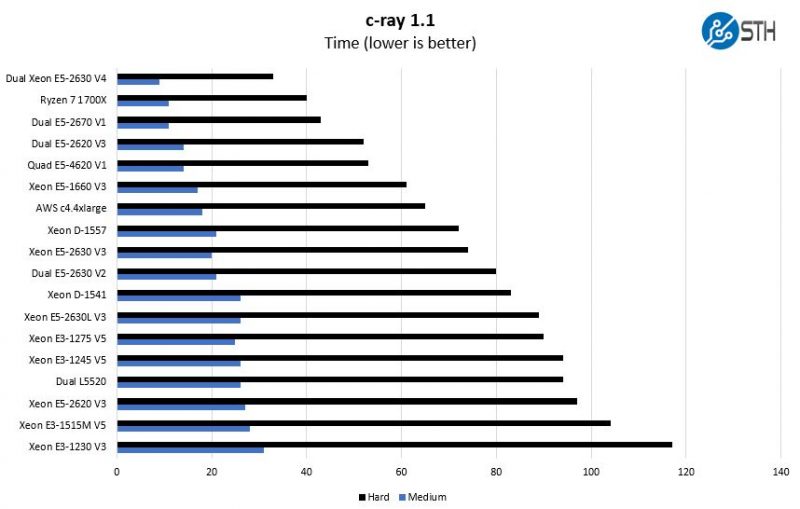
At the AMD event in SF we were bombarded by Cinebench Results. That is somewhat fun since William at STH crushed Cinebench R15 with Quad E7 systems twice and even got Intel Knights Landing chips to boot and run Cinebench. In our Linux-Bench suite, we have c-ray 1.1 which is perhaps the most similar. Looking at the results, the Ryzen 7 1700X performs extremely well. We have not had enough time with the chips to investigate heavily, but it is safe to assume these are the types of calculations that run (extremely) well on AMD Zen architectures. Whenever someone shows you a single benchmark workload repeatedly, you are likely to assume that is the one they do the best in.
7-zip Compression Performance
7-zip is a widely used compression/ decompression program that works cross platform. We started using the program during our early days with Windows testing. It is now part of Linux-Bench.
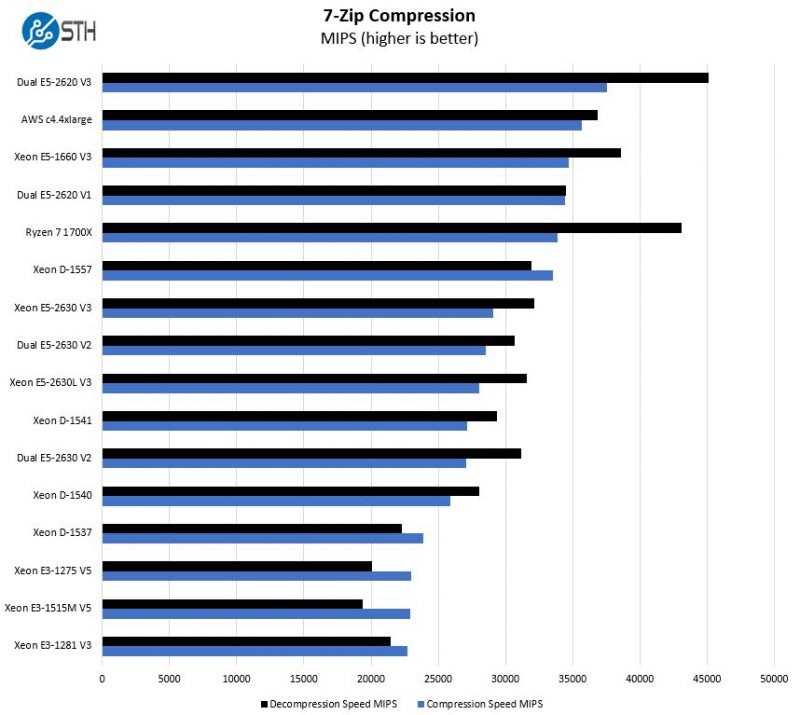
This is a fairly sharp contrast to the c-ray numbers on the compression side. De-compression on Ryzen is great compared to most Xeons. The idea that AMD is in the ballpark of ~$600 6 and 8 core Xeons that were launched 2.5 years ago seems about right. We are, of course, looking solely at compute here as the Xeon E5 series chips have enormous platform advantages.
NAMD Performance
NAMD is a molecular modeling benchmark developed by the Theoretical and Computational Biophysics Group in the Beckman Institute for Advanced Science and Technology at the University of Illinois at Urbana-Champaign. More information on the benchmark can be found here.
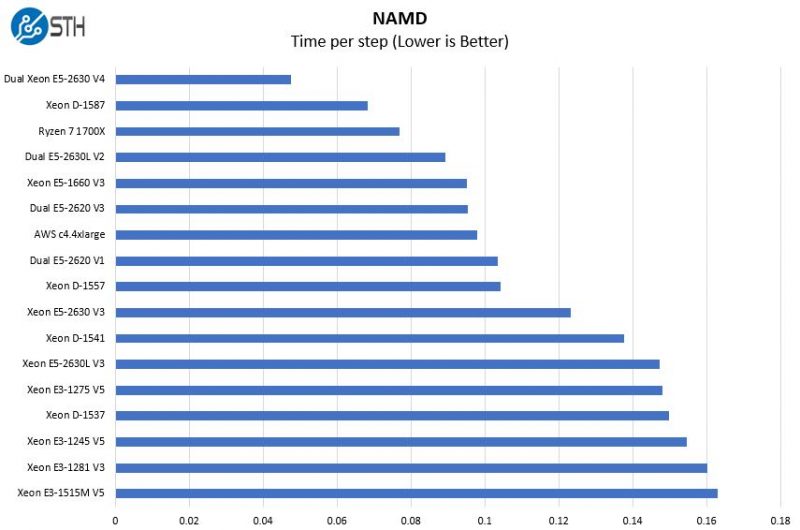
NAMD is another workload that does extremely well on the Zen architecture. We want to focus quickly on the bottom of this chart with Xeon E3 results. The Xeon E3 parts are based on the same core as the Intel Core i7 desktop parts, essentially with ECC UDIMM support. If you are running 4 core Intel, it is not even competitive. For those in university classes with Core i7 molecular modeling machines under your desks (e.g. gaming rigs) it is time to find a grant to get an upgrade.
Sysbench CPU test
Sysbench is another one of those widely used Linux benchmarks. We specifically are using the CPU test, not the OLTP test that we use for some storage testing.
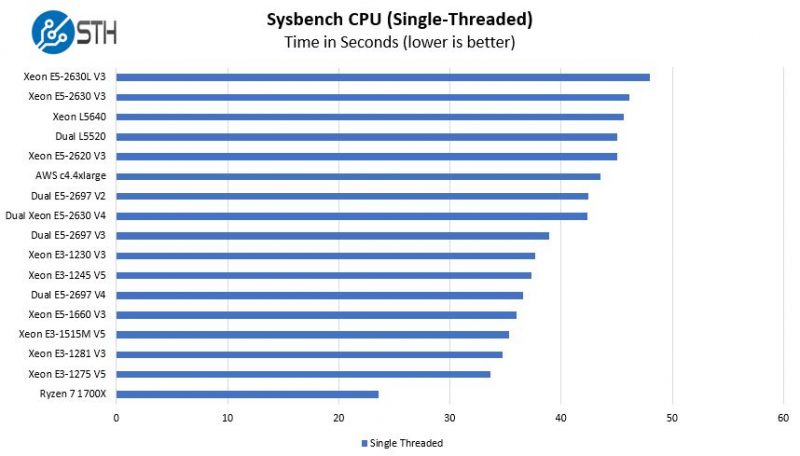
We normally present the multi-threaded figures for Sysbench but instead we wanted to provide single-threaded results since much of the Ryzen push is multi-threaded. We know there are folks running, for example, rails applications where single thread performance is tantamount. The Ryzen 7 1700X chip decimated the field. We even went back to the Intel Xeon L5520 from Q1, 2009 that powered many Facebook’s servers of that era just to show how far AMD is moving the needle. The bottom line here is simple: Zen is not just a multi-threaded story, it is IPC competitive in several workloads.
OpenSSL Performance
OpenSSL is widely used to secure communications between servers. This is an important protocol in many server stacks. We first look at our sign tests:
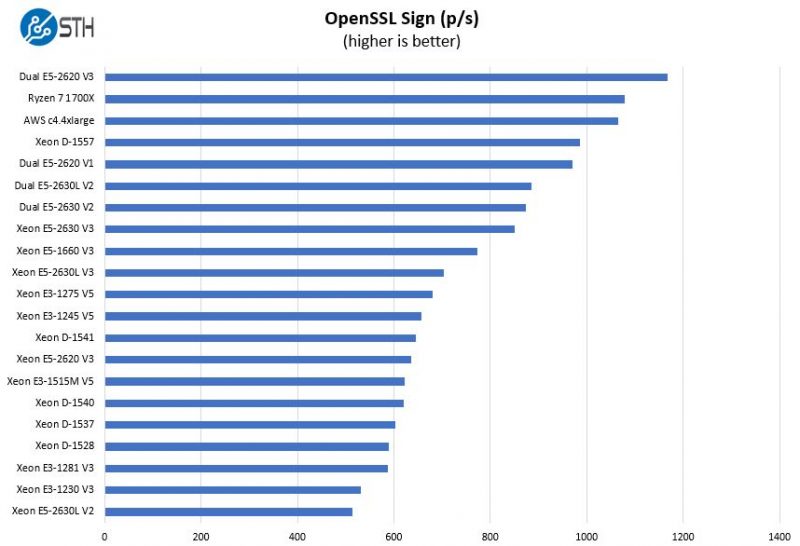
Here are the verify results:
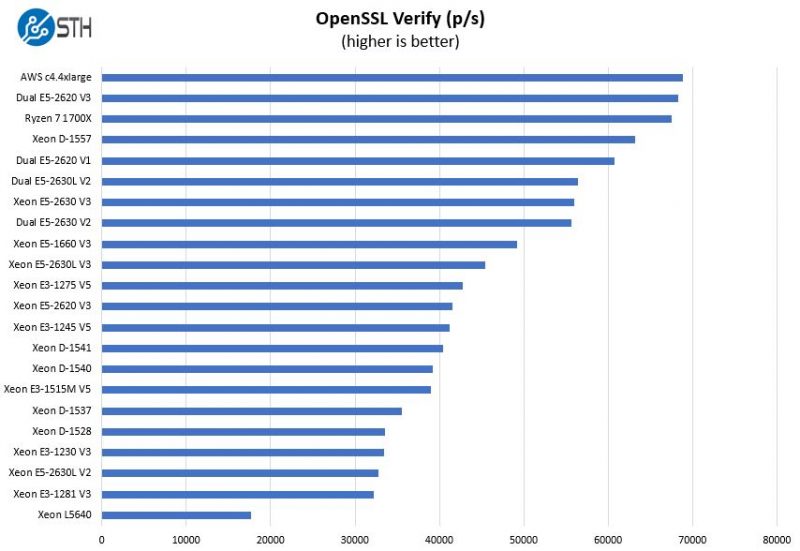
We are using rsa4096 for these at it is not the most heavily optimized for any architecture, which gives consistent results. When we get into Naples testing we will likely delve deeper and do AES CBC and GCM, for example, which will have more real-world web OpenSSL applicability. The Ryzen message is clear, eight modern cores are crushing these benchmarks even at a $400 price point.
Final Words
From a pure performance perspective, the AMD Ryzen is more than just competitive, it is downright awesome. After having hands-on time at the AMD Tech Day, I hit publish on our Ryzen pre-order story then promptly did so for a personal system and a system for our DemoEval lab (ETA on that one late March 2017 as it has some benchmarks it will be running in the meantime.) In fact, I even pre-ordered a complete set of components for STH’s William Harmon since I thought he would love the platform. We are going to have full power numbers once we get them in our standard test beds and into the data center.
The true power of the Ryzen 7 1700X platform for STH readers, aside from gaming hobbies, will be replacing non-mission critical workstations with better hardware. If you are one of the Silicon Valley startups with a cluster of cheap Core i7 systems in the office or a set of AWS build instances constantly chugging, Ryzen is going to be worth a serious look. Likewise, there is a large segment of the dedicated server hosting business that today utilizes Core i7 chips. Given the choice between a Core i7 quad-core model and a Ryzen eight-core model, we would go with Ryzen.
One glaring bit of information our STH readers should have for any Intel quad-core i7 or E3 v. Ryzen comparison, onboard GPU. It is somewhat funny to write this, but between an Intel Core i7-7700K and an AMD Ryzen 7 1700, Intel has the better GPU and AMD has the better CPU. Anything that is QuickSync accelerated has a big advantage for Intel. Furthermore, in terms of power consumption, integrated GPUs do use less power than PCIe cards, something that AMD has been telling us for years with their APUs.
We do wish that AMD enabled ECC UDIMM support (at least) on all SKUs. Intel has largely done away with the large E3 price premiums over Core i7’s. From a high-performance perspective, the AMD Ryzen 7 1700X impressed us. We are most impressed with the pricing AMD is offering as the value both on the CPUs and the motherboards is excellent.

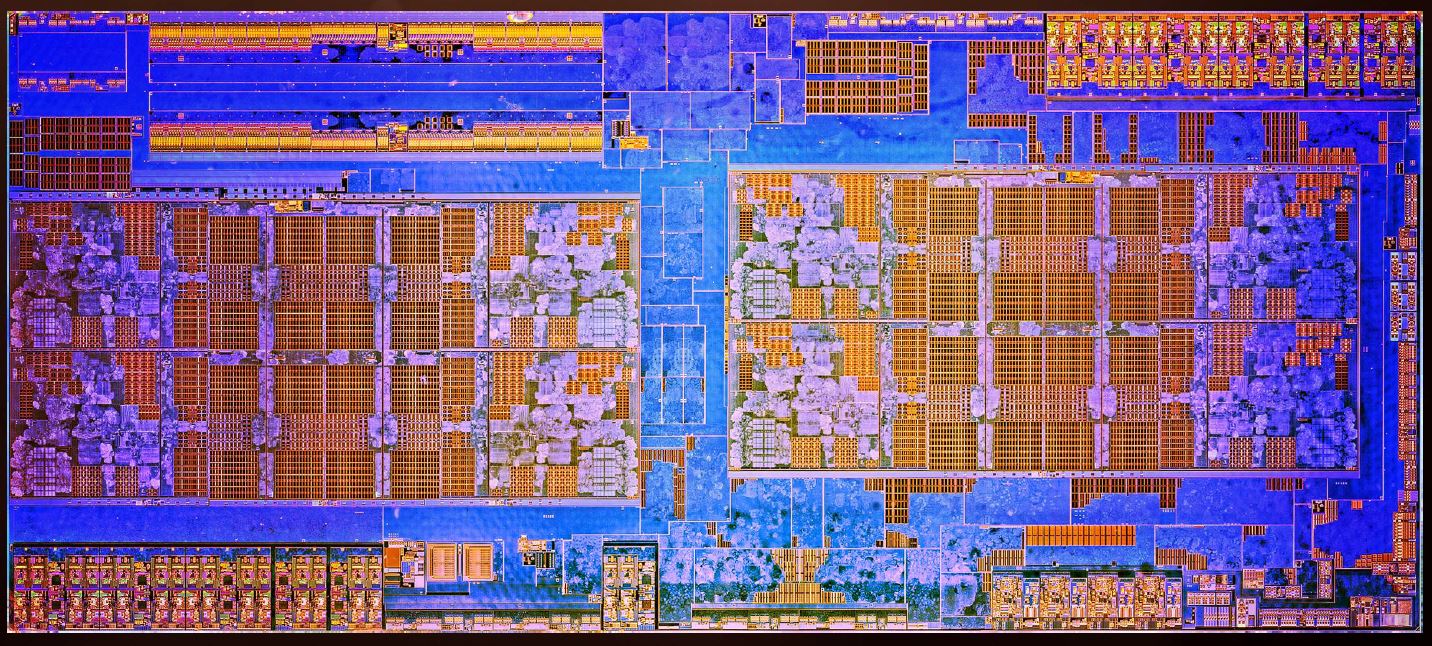
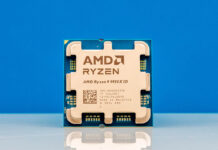

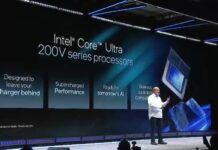
Anyway to change the color of the Ryzen results to Red/Orange/Yellow anything besides Blue?
White on white? ;-)
Always highlight the subject in the graphic, please.
Nobody gives a **** about how these perform in Linux. Windows baby!
What are your thoughts on using these for a homelab setup instead of the E3? I recently bought an E3 1230v5 and while it is a solid performer the AMD perhaps could provide a higher ceiling as it relates to running a full virtualization host (say Esxi or Proxmox or something).
Hello, do you have any information w.r.t. ECC RAM support? So far and without it Ryzen is not replacement even for E3 which is really pity since this CPU seems to be very capable.
If you do not need ECC support and you can live without iKVM, this is a good option.
Not supported on these models. There are leaks of a Ryzen Pro with ECC UDIMM support.
From Reddit live discuss today:
“ECC is not disabled. It works, but not validated for our consumer client platform.” – Robert Hallock, CPU Technical Marketing
“Validated means run it through server/workstation grade testing. For the first Ryzen processors, focused on the prosumer / gaming market, this feature is enabled and working but not validated by AMD. You should not have issues creating a whitebox homelab or NAS with ECC memory enabled.” – James Prior, CPU Business Development
More https://www.reddit.com/r/Amd/comments/5x4hxu/we_are_amd_creators_of_athlon_radeon_and_other/
Regarding ECC, according to the Reddit AMD AMA, ECC is fully supported on these but is up to the motherboard vendor to enable the option in the bios and qualify the memory.
Cool! The question is if this will happen sometime soon or AMD will leave it after Server/Notebook domains are covered and then come and release something for Workstations. Hmm, time to wait anyway.
Ho! That’s indeed very interesting. So now lets wait and see if Supermicro delivers some ryzen workstation board. Cool! And thanks for the link!
My pleasure!
I’m sure AMD wasn’t targeting servers/ws market with 1st Ryzen R7 series.
As for Supermicro or any other WS boards, I think you need to wait for the summer :)
Pretty sure we will spot something on Cebit and more on Computex.
The AMA yesterday confirmed Ryzen does support ECC though.
You have used a relatively older version of the kernel. Probably not all of the latest drivers and optimizations as well as GCC optimizations were not in Ubuntu 14.
We posted an update with kernel version 4.10.1 the latest stable kernel in our Ryzen 7 1700 benchmarks linked after the first paragraph of this article.
1. There are some motherboards that allow ECC memory to be used *with* ECC checking.
See https://www.nas4free.org/forums/viewtopic.php?t=12186&p=76126
2. Of *course* the intel has better graphics than the Ryzen! The Ryzen *does not have on-board graphics*. That chip is “Raven Ridge”.
Again – due to what we have seen with software with Ryzen – ECC is not going to meaningfully change uptime. Still many kernel panics in CentOS, Ubuntu and etc with Ryzen. Software and AMD firmware needs to mature before ECC will be impactful on these platforms.
Hi I just checked your content, it is really good read. Please have a look on my content also and let me know how you like it.